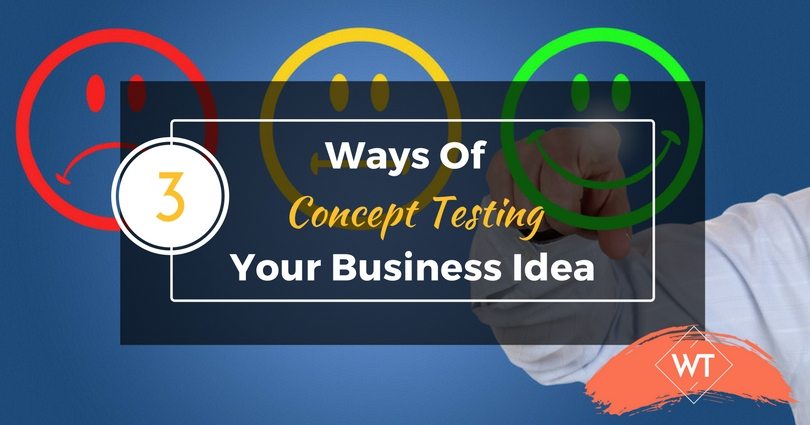3 Ways Of Concept Testing Your Business Idea

As a coach, I often work with people who want to start new businesses. It’s always a stimulating time in my work when a client realizes what kind of business they want to start, or a client comes to me full of excitement for their new business idea.
Then, what typically happens after that initial excitement begins to wear off, is that the realities of starting a new business begin to set in, and doubts start to creep up.
Among the plethora of doubts that typically spring up (which are perfectly healthy!), aspiring entrepreneurs frequently find themselves wondering things like:
- Will my business idea actually work?
- Are people willing to buy what I have to offer?
- Is there a market for what I want to do? OR is the market for what I want to do already saturated?
- What if I put all this time and effort into it and it doesn’t even work out?
Surprisingly (or maybe not), this is where a lot of people give up on their business journey. The prospect of starting a business feels too overwhelming and the sabotaging questions start to take over.
If this is sounding familiar to you, I assure you you’re not alone. And there IS indeed a risk that as a new entrepreneur, you will put a butt-load of time and effort into your business and it won’t work out!
However, there are ways to significantly reduce the risk of stepping into a business idea that won’t work. By going through the 3 ways below of concept testing your business idea, you can pre-determine whether or not your business idea is likely to work.
This way, you significantly reduce the risks, and you’ll be able to know with confidence whether or not you should go forward with your idea. Concept testing, with the right guidance, can actually save you money even though you might be worried about adding extra steps and time to your product development.
Even if you’re already extremely confident in your business idea, and ready to dive in with both feet, I highly recommend trying out some of these concept testing options.
1. Create an online survey for your ideal clients/customers
Market research is something you’ll want to do continuously throughout the course of your business, so why not get a handle on this right away?
To get started, create an online survey in Google Docs, Survey Monkey or even Typeform to concept-test your business idea.
What kind of questions to ask:
- If you have a good business idea, it should be solving some sort of problem for people. Start off by asking questions that dig into this problem (or problems) a bit deeper.
- Next, ask people who have this problem what their ideal solution would be, then share with them what you are suggesting as a solution and get their feedback.
- You can also have a question or two around how much people would be willing to pay for your product/service, or what their ideal format for delivering what you have to offer would be.
- At the end, you can ask if it’s ok to contact them to follow up with a phone interview. If someone’s answers really fall into what you feel is your ideal client/customer category, you might want to follow up with some more questions.
Be sure to gather their contact information in the survey so you can follow-up, but ONLY contact them if you have their permission!
Where to find people to fill out your survey:
Again, assuming your business idea will solve some sort of problem for people, find out where people who have this problem are hanging out online.
Check out different groups on Facebook, or use hashtags on Twitter, Instagram, or whatever form of social media tickles your fancy!
How to get people to fill out your survey:
When sharing your survey to social media, keep it short and sweet. Give people a run-down of WHO it’s for (the problem your ideal client/customer has), WHY you are doing it, HOW long it will take and WHAT they will get in return.
For example, you might want to donate $1 for every survey filled out to a charity of your choice, or enter people into a prize draw. Get feedback from a couple of people on how you want to introduce your survey, before sharing it around online.
2. Conduct interviews
Ideally, you want to conduct both online surveys and interviews when concept testing your business idea. However, if you’re torn between creating an online survey or conducting an interview, always go with the interview.
With interviews, you can more effectively capture people’s unedited language (which is extremely valuable in marketing), and you have the option to have more of a dialogue with potential customers/clients; this dialogue may reveal things you never would have thought to ask in a survey. Interviews can be held in person, over the phone, or on Skype (or another online medium).
You can conduct interviews for market research on 2 fronts:
- Talk to people already in the industry you are exploring
- Talk to potential clients/customers
What kind of questions to ask:
For both types of interviews, simply keep the questions focused on the problems faced by the person you are interviewing, and their ideal solution (see above).
Where to find people for interviews:
- First, follow-up with any people who fit your ideal client/customer category from online surveys you’ve done (assuming you’ve been granted their permission!).
- Next, you can reach out to people online, either publicly through social media, or personally to anyone you’ve built some kind of relationship with online.
- As well, you can contact any acquaintances you have in the “real world,” or people you’ve met at networking events, to have coffee and go through your interview questions.
How to get people to have an interview with you:
Market research/concept testing interviews will likely take a bit longer than a survey, typically taking anywhere from 20 minutes to an hour. Therefore, it’s important to make sure you are offering value in some way to the people willing to give you their time. One idea is to give interviewees a free sample of your product. Or, if you are offering your services as a consultant, offer to give interviewees suggestions and tips to help them with their problem as you go through the interview.
3. Selling your service/product in advance is not the opposite of concept testing
Selling your service/product in advance is not the opposite of concept testing. In fact, it is actually a valuable part of the concept testing process. When starting a business, many people think that everything needs to be perfect before actually beginning to sell a product or service. It’s a common fallacy to think we need to first design our products/services, and build the business with sharp branding and a snazzy website, before we are ready to sell.
The problem with doing things that way, is you run a sharp risk of spending your time and money on something that you have no idea whether or not people will actually buy in the real world (even if you’ve done a crap ton of market research!).
So to remedy this, and increase the probability that your business idea will actually work, try selling your product/service as a first step in your concept testing. Don’t stress about the perfect business. Sell it before it’s perfect, and collect feedback to modify as you go along.
Not comfortable with selling right away? Try giving away your service or product for free in exchange for a testimonial, feedback, or referral to build up your businesses credibility.
As a bonus of going through these steps of concept testing your business idea, you’ll also be able to refine your idea in a way that is likely to make your business idea more successful.
So go forth with your concept testing and design your business in the confidence that it will SUCCEED!









Leave a Reply